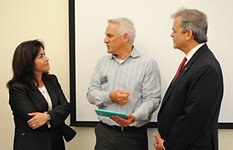Page Two: Old Dogs, New Kicks
The past is a lie, and the future is unknowable – but we think it has something to do with the Internet
By Louis Black, Fri., Aug. 4, 2006

The Chronicle is a publication of opinions. Certainly, I hope our reporting is both fair and complete. However, objectivity or disinterested reporting are positions to which this publication does not pretend (forget that I really believe those terms invariably need to be heavily qualified).
The Chronicle Web site's home page now prominently features a link to Chronicle Forums (austinchronicle.com/forum).
In order to participate in forums, you do not have to register; there is no password to remember. You can post and/or respond to articles and posts immediately. Already it is much easier for you, our readers, to offer up your opinions on national, state, and/or local politics, and likewise your take on Austin, music, arts, theatre, food, restaurants, dance, books, and so on. You can comment on some piece in the Chronicle, add your thoughts to an ongoing discussion, and/or initiate completely new topics.
Rather than make declarations or offer concrete proclamations, the Chronicle is designed to stir thought and raise debate. In Austin, where there is almost no thought without a counterthought (almost always, in fact, armies of diverse counterthoughts), dialogue and debate are like breathing.
From last week: "Please make the extra effort and help prime the pump. Read through the forums of interest to you, post comments, and offer replies. Sure it's in a very early stage, but over time, we are hoping that this should mature into an ongoing, open, and open-ended community dialogue."
Last week, the second section of this column began by stating, "In the next couple of weeks I want to return to talking about some major ideas that drive this column. On the way there I want to offer some assumptions that are basic to my overall arguments." No claim was made, and none will be, that these ideas are innovative or original; rather, they represent my core beliefs as well as I can explain them.
The second major idea was: "The past is not just a fiction but a lie, the present is misunderstood, and the future is unknowable." A letter writer attacked this, substituting the word "history" for "past" and finding a Henry Ford quotation – "History is bunk" – as a way, I think, of mocking and discrediting my position. Having a thought, or even a body of thoughts, tainted because one shares the same ideas with someone else, especially if you offer mostly quite divergent opinions, is relatively meaningless. I was surprised the writer couldn't find a quote from Hitler saying the same thing.
As to the point I was getting at, well, it has little to do with history. As I wrote in the June 9 "Page Two" column:
"The past is more than a fiction; it is a lie.
"People are constantly lamenting how this nation and the world have changed for the worse. This is reactionary romanticism, a pasteurized, homogenized, idealized Dick-and-Jane version of America's past – when doors were left unlocked, families went to worship together, and towns looked like Norman Rockwell as rendered by Currier and Ives. At some point I will go into this much more."
The point is that the remembered and/or romanticized past, especially as deployed in support of opinions and/or policies, is not necessarily a historically based strategy. Rather, it can be very much the opposite, utilizing select "pasteurized, homogenized, idealized" memories, often invalid even in and of themselves, to support positions which are, at best, ahistorical, being bigoted and based on prejudices.
This is true of almost all arguments that champion the past over the present.
Yes, when I lived in Vermont in the early 1970s, not only could you leave your house unlocked, you could leave your keys in the car as well. This is no longer true. It is also the case that, at that time, there was precious little work to be found in Vermont, an increasingly poor state offering almost no creative or employment opportunities for anyone, especially the young. This, too, has changed.
A while back, I attended a speech at a monthly club dinner where people were decrying the current quality of media news, lamenting the kind of fearless, objective reporting that had helped make this nation great. Share the drugs! This isn't true. The history of American newspapers throughout much of the last century was one of slanted and limited coverage. Almost every major urban area had at least two daily papers, usually representing opposing points of view. Many of the standards accepted today didn't exist then, and I wouldn't be surprised if many of the most easily remembered great newspaper reporters of the past participated in activities now regarded as unacceptable: condensing quotes, making up quotes, offering composite characters, aggressively slanting the news to fit a specific political agenda. Papers were expected to advocate, offering outright partisan positions – and not just on the editorial pages. Consider how much legislation and how many judicial rulings have been responses to the influence of the media in tainting potential jurors.
There is a book, which I have not read, that laments the radically shrinking popularity of what were once widely enjoyed and shared communal activities, such as bowling. First, remember that bowling leagues mostly represented fairly homogeneous social, economic, racial, and employment groups. Currently, the Web has absolutely busted open interpersonal communication to the point where it is dramatically less limited by geography and class. The loss is not one of community but simply of a known, established tradition to the unknown future – and to the most aggressively democratic communication forum yet to exist. Yes, the Web's ramifications and its cultural resonance are still to be discovered, but using the past as a way of considering the Web is like restricting and criticizing micro-electronics because they exceed Stone Age expectations.
And again, more on this later. ![]()










